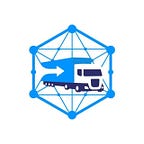NEWSLETTER
Intermodal Transport
Intermodal Transport
Intermodal transport is an advanced logistics strategy that leverages the seamless integration of different transportation modes to optimize the distribution of goods over long distances. This approach is crucial for addressing the challenges posed by expanding global supply chains and the growing demand for international shipping.
Intermodal transport involves coordinating road, rail, water, and air transportation modes, enabling goods to be efficiently shifted between these modes. It provides the opportunity to harness the specific capabilities and advantages of each method to achieve a more efficient and cost-effective global transportation service.
Benefits of Intermodal Transport
The adoption of Intermodal transport offers several significant advantages:
- Operational Efficiency: By using intermodal transport, businesses can reduce delivery times and enhance punctuality. For example, a container can travel by sea for a long international leg and then be transferred by rail or truck to reach its final destination, ensuring more incredible speed.
- Cost Reduction: Selecting the most appropriate transportation modes for a shipment’s specific needs can lead to significant cost savings. Rail or sea transportation is often more cost-effective than road transport over long distances, reducing the overall logistics budget for businesses.
- Environmental Sustainability: Intermodal transport contributes to reducing the environmental impact of freight transportation. Rail and sea transportation modes are generally less polluting than road transport, contributing to environmental sustainability goals.
- Flexibility: This approach offers greater flexibility in managing supply chains. Companies can quickly adapt transportation solutions to the changing market demands and fluctuations in demand.
- Reliability: Intermodal transport reduces the risk associated with potential delays and disruptions, as goods can be efficiently rerouted across different modes in case of issues along the route.
Challenges of Intermodal Transport
Despite its numerous advantages, implementing intermodal transport presents some challenges, including:
- Organizational Complexity: Managing different transportation modes requires precise planning and coordination, which can be complex for businesses.
- Infrastructure and Technology: Adequate infrastructure and technology are required to facilitate the smooth transfer of goods between modes, such as intermodal terminals and advanced monitoring systems.
- Regulations and Documentation: Intermodal shipments may involve various rules and complex documentation, especially when dealing with international freight.
- Risk Management: Managing risks related to delays, cargo damage, and service disruptions requires careful planning.
In summary, intermodal transport is a crucial element in modern logistics, allowing businesses to optimize their operations, reduce costs, and contribute to environmental sustainability. Its implementation requires careful planning and coordination, but the long-term benefits more than justify the effort.
What is Evoload?
Evoload is a blockchain Freight Exchange platform built on the MultiversX Ecosystem, that is going to enhance and disrupt the logistical and transportation scene. The first in Europe to offer business intelligent solutions that benefit all stakeholders whilst using blockchain technology to create an unprecedented rewarding workflow.
